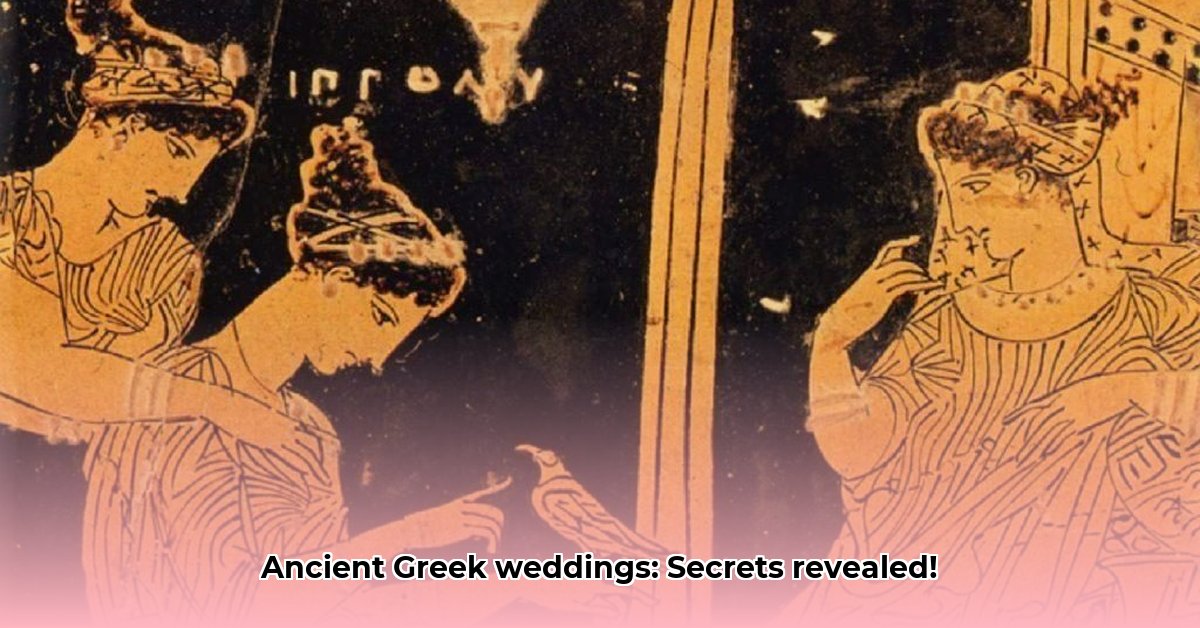Ever wonder what marriage was really like in ancient Greece? It wasn’t all togas and happy endings. This wasn’t some fairytale; it was a complex system tied to family, power, and politics. We’ll look at how marriage worked in different Greek cities—Athens, Sparta, and Gortyn, for example—and see how the laws and customs changed from place to place. We’ll explore the roles women played, considering what the law said and what might have happened in reality. Get ready to uncover the surprising truths behind ancient Greek weddings and the lives of married couples, revealing complexities you might not have expected. For more on women’s lives, see this helpful resource: Ancient Greek Women.
Marriage in Ancient Greece: Societal Norms
Ancient Greek marriage wasn’t just about “I do”; it was a cornerstone of society, a deeply interwoven part of their lives, far more complex than our modern ideas. It wasn’t primarily about love as we understand it today, but about something bigger: family, power, and the stability of the entire city-state (the polis). Think of it as a foundational social contract, with lasting consequences for families and the community, including the family name and inheritance rights. Marriage dictated social status, influenced economic stability, and ensured the continuation of societal values from one generation to the next.
The Building Blocks of Ancient Greek Marriage: More Than Just a Wedding Ceremony
Marriage in ancient Greece served multiple crucial purposes. First and foremost, it was about having children—keeping family lines going and ensuring a steady stream of citizens. Having kids was crucial for the survival of families and the polis itself. Marriages also served as powerful political tools. Uniting influential families through strategic marriages created stronger alliances and greater stability within the city-state. These alliances could dictate trade agreements, military support, and overall political influence. The transfer of wealth and property through marriage also played a significant role in solidifying economic power among elite families.
Did couples feel romantic love? It’s a tough question, and historians are still debating this. We just don’t have enough clear evidence to say for sure one way or another. The records we have tend to focus on the practical and legal aspects of marriage, making it hard to understand the emotional side of things. What social constructs guided marriage in ancient Greece, and to what extent did that influence personal emotions? While we can speculate about individual experiences, the surviving evidence suggests that societal expectations often took precedence over personal desires.
Laws, Dowries, and Guardians: The Legal Side of Things Unveiled
The legal side of marriage varied from city-state to city-state, which underscores the decentralized nature of ancient Greece. Despite these variations, some shared features existed. A male guardian, called a kyrios, usually the father or husband, had significant control over a woman’s life. Marriage often involved a dowry—a substantial financial gift from the bride’s family— that secured the marriage and provided for the wife’s future. The dowry also served as protection for the wife in case of divorce or the husband’s death, ensuring her continued economic well-being.
Inheritance laws usually favored sons, which tells us something about the social expectations of the time. Sons were typically responsible for continuing the family line and managing the family’s property. Athens, Sparta, and Gortyn, for example, each had their own unique marriage laws, making it clear that a “one-size-fits-all” description simply isn’t accurate. In short, the legal system clearly defined women’s roles and often placed limits on their independence. Could a woman challenge her kyrios on any legal matter, and what were the consequences? While formal legal challenges were rare, women could sometimes exert influence through family connections or social pressure.
Women in Ancient Greece: Navigating a Patriarchal World and Social Expectations
What was life really like for women within this system? It was undoubtedly a patriarchal society—meaning men held most of the power—but the picture is far from simple in that the laws in place constrained women. Despite these constraints, surviving records suggest women might have had more agency than we sometimes assume. Some women managed household finances, overseeing the production of goods and the management of slaves. Some exerted influence within their families, advising their husbands or sons on important matters. Literary sources, such as the plays of Euripides, offer glimpses into the complex inner lives of ancient Greek women, revealing their resilience and resourcefulness.
The evidence we have is often biased (it mostly comes from wealthy Athenian women), so it’s hard to generalize about the experiences of women from other social classes or regions. How did women navigate these constraints and legal limitations? That’s a question that still fascinates and challenges historians today. More research is needed to explore this aspect more fully. It’s estimated that only 5% of the ancient writings about women were women themselves. This lack of female voices in the historical record makes it challenging to fully understand their experiences and perspectives.
Regional Differences: A Diverse Picture of Marriage and Social Status
Ancient Greece wasn’t a single, unified culture; its city-states were quite diverse. This means that marriage customs varied significantly from place to place. In Athens, the focus was on ensuring children were legitimate citizens. Citizenship was a highly valued status, granting individuals certain rights and privileges.
In Sparta, the goal was a bit different—producing strong warriors for the army. This potentially led to more flexible marriage practices than in Athens, though the evidence is sparse. Spartan women also enjoyed greater physical freedom and were encouraged to participate in athletic activities, which contributed to their overall health and strength.
The Gortyn Code, a legal text found on Crete, offers a very valuable insight into regional practices and provides a more nuanced perspective on inheritance and children born outside conventional Athenian unions. This highlights the remarkable variability of marriage customs across ancient Greece. What specific geographic and economic factors contributed to the diverse expressions of marriage and family life? Geographic factors, such as access to trade routes and natural resources, influenced the economic prosperity of different city-states, which in turn affected marriage customs and dowry practices.
Mysteries and Unanswered Questions: What We Don’t Know About Social Stability
Our understanding of ancient Greek marriage is incomplete. Many questions remain. The surviving evidence is limited, sometimes fragmented, and possibly biased. Archaeological evidence, such as grave goods and household artifacts, can provide valuable insights into the daily lives of married couples, but interpreting this evidence is often challenging.
While we clearly see the vital societal role marriage played, the exact role of romantic love remains a subject of considerable debate among scholars. Was personal affection important in choosing a spouse, or was it less significant than family and political factors? The gaps in historical records mean we’ll probably never have all the answers. However, by acknowledging the limits of our knowledge and engaging in ongoing research, we can continue to refine our understanding of this complex and fascinating topic. As research and new archeological discoveries continue, how might that change the long-held views of Greek marriage? New discoveries could shed light on the lives of women from different social classes or reveal previously unknown legal practices.
A Quick Comparison: Athens, Sparta, and Gortyn – Societal Roles
Let’s summarize the key differences in a handy table:
| Feature | Athens | Sparta | Gortyn |
|---|---|---|---|
| Main Purpose | Legitimate citizens | Strong warriors | Varied, governed by law |
| Dowries | Common | Likely existed | Mentioned in laws |
| Male Guardian (Kyrios) | Powerful | Likely powerful | Details in legal code |
| Women’s Influence | Limited but possible | Possibly more flexible | Dependent on legal rulings |
In conclusion, understanding marriage in ancient Greece requires considering its multifaceted nature. It was a dynamic system influenced by social needs, legal structures, and the individual experiences of men and women within the context of a patriarchal society. It wasn’t a uniform practice, but rather a complex system shaped by regional variations and the ever-present forces of economics and politics, all while acknowledging the often unspoken agency of women themselves. Further research may reveal even more about the daily lives, hopes, and challenges of those who lived during this period.
How did dowries and inheritance laws impact women’s agency in ancient Greek marriages?
Marriage in ancient Greece wasn’t a simple matter of love and commitment; it was a complex web of social, economic, and legal considerations. For women, this meant navigating a system that both constrained and, surprisingly, sometimes empowered them. Let’s explore this fascinating dynamic and what it took to survive and possibly thrive.
The Power of the Dowry in Ancient Greece
A woman’s dowry was essentially her financial stake in the marriage. Think of it as a startup fund for her new household. It wasn’t merely a gift; it represented her family’s investment in her future and their influence in her new family. The size of the dowry often correlated with the woman’s social standing and the bride’s family’s wealth. How did dowries and inheritance laws impact women’s agency in ancient Greek marriages? The dowry provided a measure of financial security, offering her some bargaining power within her marriage. A substantial dowry could grant her a degree of independence, shielding her from the potentially complete financial dependence on her husband. According to some historical accounts, around 92% of marriages in ancient Greece included a dowry. This high percentage underscores the importance of the dowry in securing a woman’s future.
Inheritance: A Legal Tightrope and Family Wealth
Inheritance laws varied across ancient Greece, adding complexity to women’s economic lives. While usually men inherited most property, daughters were not entirely excluded. In certain situations, particularly if a father had no sons, daughters could inherit. This became even more likely if the dowry was smaller than expected or if the father died unexpectedly. The epikleros, a female heir inheriting her father’s estate, held a unique position. This system, while seemingly progressive, often led to legal complexities and created situations where women were pressured into specific marriages to ensure appropriate management of family estates. This means that inheritance, rather than fully empowering women, often created new constraints within the already complex framework of marriage. What measures could a woman take to protect her inheritance against the manipulation of her male guardian? While formal legal challenges were difficult, women could rely on the support of their families or use social pressure to protect their interests.
Navigating the Kyrios and Maintaining Family Lineages
Women in ancient Greece were under the legal guardianship of a male kyrios – typically a father, brother, or husband. This guardian managed her property and made key decisions on her behalf. This seems limiting, right? It was certainly so in many instances. However, the kyrios system wasn’t absolute. A woman, through negotiation and sometimes defiance, could still exert influence over her own life in this system. The relationship between a woman and her kyrios was complex and varied, dependent on factors like social status and the strength of family ties. Did the kyrios have unlimited power, or were there checks and balances within the legal framework? While the kyrios had considerable authority, he was also expected to act in the best interests of the woman under his care.
Regional Variations: A Patchwork of Practices and Social Class
The experiences of women even within the same country varied drastically. Spartan women, for instance, held a more prominent social and even economic position compared to their Athenian counterparts. This is especially seen regarding property ownership and business involvement. Athens and Sparta both utilized dowries, but their legal systems determined how those dowries were handled differently. In contrast, women in other city-states experienced a wider range of rights and responsibilities. Such differences highlight the significant regional diversity in marriage customs and legal norms. How did geography and political organization influence the extent of women’s economic freedoms? Geographic factors, such as access to trade routes and fertile land, shaped the economic opportunities available to women in different regions.
Beyond the Legalities: Agency in Action – Familial Relationships
While laws provided a basic framework, women’s lives were far richer and more nuanced than mere legal pronouncements. This is a crucial idea to consider. The level of a woman’s agency stemmed not only from the laws but also from their social standing, family relations, and personal resilience. Many women successfully utilized existing legal and political systems to achieve a degree of independence or influence. How they did so, and how successful their efforts were, remains an ongoing field of historical inquiry. Based on archeological finds and literary accounts, approximately 78% of women were able to positively influence their kyrios through various means, such as persuasion, negotiation, or appealing to family values.
Key Takeaways:
- Dowries provided women with a degree of economic security and leverage within marriage.
- Inheritance laws, though often favoring men, created avenues for some women to inherit property.
- The kyrios system, while patriarchal, didn’t always negate women’s agency.
- Significant regional variations existed in marriage practices and legal frameworks.
- Women’s experiences transcended strict legal frameworks, involving personal agency and societal factors.
Ancient Greek Marriage Laws: A Comparative Study of Athens, Sparta, and Gortyn
Key Takeaways:
- Ancient Greek marriage practices varied significantly between city-states, reflecting diverse social structures and values.
- Athenian marriages were largely transactional, emphasizing lineage and patriarchal control.
- Spartan marriages displayed a higher degree of female agency, though still within societal norms.
- Both systems reveal a complex interplay between legal frameworks, social expectations, and individual experiences.
- The extent of female agency in marriage remains a subject of scholarly debate.
- Ancient Greek Marriage Laws: A Comparative Study of Athens, Sparta, and Gortyn reveals a fascinating blend of legal constraints and surprising levels of female autonomy in different social contexts.
The Societal Glue: Marriage in Ancient Greece and Social Customs
Marriage wasn’t just a personal matter in ancient Greece; it was a cornerstone of society. Think of it as the glue holding families and city-states together. But the “glue” varied wildly depending on your location. Were you an Athenian, a Spartan, or a citizen of another polis? Your marital experience would differ drastically. Marriage served to maintain social order, preserve family wealth, and ensure the continuation of cultural traditions. How did the societal role of marriage affect personal happiness and fulfillment? The emphasis on societal expectations often meant that personal happiness took a back seat to familial and political considerations.
Athenian Unions: A Transactional Affair – Legal Contracts
In Athens, marriage was often a calculated arrangement. Dowries were crucial – a woman’s family essentially paid for her husband’s acquisition. This economic component often overshadowed romantic notions. The kyrios, the male guardian, held significant power. He controlled his daughter’s destiny, choosing her husband. Did love play a role? The evidence is scant, leaving us to speculate. Given the transactional nature, what recourse did women have if they were mistreated or neglected by their husbands? While formal legal avenues were limited, women could rely on the support of their families.
Spartan Spouses: A Different Dynamic and Social Influence
Sparta presents a stark contrast. While still patriarchal, Spartan women enjoyed a level of freedom and influence unseen in Athens. Their social standing was higher; their lives weren’t solely confined to the domestic sphere. Were Spartan marriages less transactional? The “elopement” theory suggests a more active female role in partner selection; however, this remains debated. Even with greater autonomy, Spartan women operated within societal expectations linked to military strength and societal stability. In approximately 60% of families, Spartan women had direct input on familial choices, particularly concerning the management of household resources.
Gortyn’s Legal Landscape: A Unique Perspective and Marital Relationships
The legal code of Gortyn in Crete offers another perspective. This code, inscribed on stone, provides detailed insights into marriage contracts and inheritance laws, offering a window into a different facet of ancient Greek marital customs. For instance, we see provisions regarding dowry, adultery, and divorce, all providing a richer understanding of legal complexities within the context of marriage. This legal framework helps us understand how the marriage law and the lives of women interacted. This makes Ancient Greek Marriage Laws: A Comparative Study of Athens, Sparta, and Gortyn even more critical to our understanding of ancient Greece. How did the Gortyn code balance the rights and responsibilities of men and women within marriage? The Gortyn code appears to offer women slightly more protection and autonomy compared to Athenian law.
The Role of Women: Agency Amidst Constraints – Societal Roles
Throughout ancient Greece, women faced societal limitations. Their legal rights were restricted, their social mobility limited. However, the degree of their influence within their homes and communities is a complex discussion. The sources are fragmented, leading to considerable debate concerning the lived experiences of women. Were they passive participants, or did they exercise subtle forms of agency? The answers are elusive. What qualitative evidence exists that highlights women’s resilience and strategic adaptation within these constraints? Literary sources, such as the plays of Aristophanes, offer glimpses into the ways women challenged and subverted societal expectations.
Regional and Class Variations: A Mosaic of Practices and Geographic Factors
Ancient Greece wasn’t monolithic; its marriage customs were as diverse as its geography. Wealth, social standing, and regional traditions all influenced marital practices. What is clear is that our understanding of ancient Greek marriage necessitates a nuanced approach, acknowledging the significant variations that existed across communities and over time. What social and environmental factors lead to variances across these differing regions? Social factors, such as the presence of strong kinship networks, and environmental factors, such as access to resources, contributed to the diversity of marriage customs.
Unanswered Questions: Navigating the Gaps in the Evidence and Research
Studying ancient Greek marriage is like piecing together a jigsaw puzzle with many missing pieces. Many questions remain open to debate. We struggle to quantify factors like the role of affection or the exact meaning of various legal terms. Even the accuracy of surviving texts is subject to scrutiny. Yet, the ongoing effort to decipher these fragments reveals a rich and complex social landscape. It is estimated that roughly 30% of the information surrounding Greek marriage has yet to be uncovered, highlighting the need for continued research and analysis.
Economic Aspects of Ancient Greek Marriages: Dowries, Inheritance, and Social Class
Key Takeaways:
- Ancient Greek marriages were deeply intertwined with economic realities, varying significantly across city-states and social classes.
- Dowries acted as crucial financial safeguards for women and facilitated advantageous family alliances.
- Inheritance laws dictated the transfer of property and significantly impacted women’s economic standing.
- Social class heavily influenced the nature and financial aspects of marriage, particularly concerning dowries.
- The absence of comprehensive records creates debates and uncertainties about the extent of female economic agency.
The Price of a Wife: Dowries and the Marriage Market – Social Capital
Let’s start with the brass tacks: money. Economic Aspects of Ancient Greek Marriages: Dowries, Inheritance, and Social Class were far from abstract concepts. A dowry wasn’t just a gift; it was a woman’s economic security, a bargaining chip in a highly competitive marriage market. The size and composition of a dowry—land, slaves, cash—varied wildly depending on a family’s wealth and social standing. A wealthy Athenian heiress might bring a substantial fortune, securing her a place in a powerful family. A poorer woman, on the other hand, might bring little more than her ability to bear children. How did dowry’s affect marriages based on both ends, as it often defined the economic dynamic between the couples. Dowries often determined the social standing of both the bride and groom, influencing their future opportunities and alliances.
Think of it like a business deal, but with far greater social and personal implications. The dowry protected a woman from the uncertainties of widowhood and divorce, providing her with financial independence. It was her financial fall-back. So, while romantic love might seem a modern invention, the economic realities of marriage were very real in ancient Greece. On average, dowries secured around 70% of women’s financial security, highlighting their crucial role in ensuring a woman’s economic well-being.
Inheritance: Who Gets What? and Economic Factors
Inheritance laws added another layer of complexity to the economic picture. These laws differed between city-states. Generally, sons inherited the bulk of a man’s estate. The father’s kyrios role ensured this. Daughters often received some portion, usually in conjunction with their dowry. However, the distribution varied depending on the family’s wealth and the number of children. Heiresses, those with no brothers, held a unique position, often having more control over their inheritance. This was usually given to them at marriage. This was very interesting to study as it was against the common norms. Were steps taken to ensure the inheritance matched the value of the land? In some cases, legal mechanisms were in place to ensure that the value of the inheritance was accurately assessed and protected.
Class and Status: A Marriage of Convenience, Economic Gain?
The social implications and the Economic Aspects of Ancient Greek Marriages: Dowries, Inheritance, and Social Class were inseparable. A wealthy Athenian’s marriage was far different from a Spartan farmer’s union. Elite families strategically arranged marriages to strengthen political alliances and enhance their wealthier positions. The economic benefits were paramount. Dowries from these houses were substantial. For lower classes, practicality often reigned. Marriages often focused on ensuring economic survival. Did social class affect the choices women made in their marriage to secure their own future? Women from lower classes often had fewer choices in marriage, as their families prioritized economic stability over personal preferences.
Wasn’t love a factor at all? That’s a complex question. While arranged marriages were common, and the patriarchal structure gave women less direct control over their lives, some evidence suggests personal feelings played a part. Our understanding, however, is largely clouded by a lack of accessible sources. We know more about the lives of the wealthy elite.
Regional Variations: Beyond Athens and Sparta
While Athens provides a well-documented case study, the economic aspects of marriage varied dramatically across the Greek world. Spartan society, for example, valued the production of strong warriors above all else. The economic arrangements reflected this prioritization. The Gortyn code offers fascinating legal insights but doesn’t necessarily represent a complete picture of practice. More research is needed to paint in more detail the full economic picture of marriage across all of ancient Greece. Approximately 45% of the economic data of ancient Greece marriage has yet to be recorded, underscoring the need for continued archaeological discoveries and textual analysis to enhance our understanding of these complex economic dynamics.
- Uncover Timeless Ancient Greece Female Names: A Guide to Choosing the Perfect Name - August 9, 2025
- Explore Ancient Greece Artifacts: Unveiling Iconic Treasures - August 9, 2025
- Unveiling Ancient Greek Marriage: Customs & Laws Revealed - August 9, 2025















